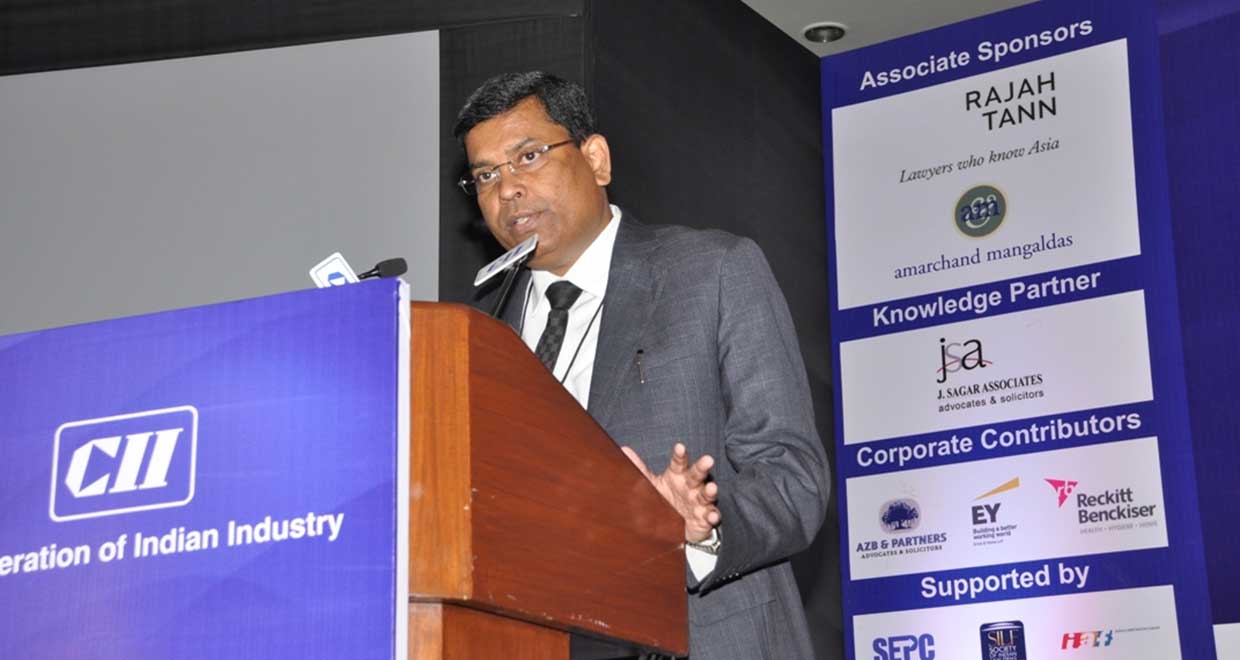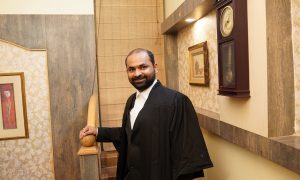Mr. Ratan K. Singh graduated from Delhi University, batch of 1996. He is currently the Director of Chartered Institute of Arbitrators (India). His practice mainly consists of International and Domestic Arbitration, International Commercial and Financial Law, Mining Law, Construction and Infrastructure Law, Environmental Law, Constitutional and Administrative Law.
In this interview we speak to him about:
- Building up a firm clientele
- Serving as an arbitrator in various domestic and international arbitrations
- Being the Director of CIArb India and a career in Arbitration
Please tell us what motivated you to pursue legal studies.
I somehow felt that my personality, nature and approach towards life would go well with this profession and intuitively decided to pursue legal studies. I strongly believe that it should really come from within and there should be a strong urge for the profession. If you believe in “giving”, this is the most appropriate profession. However these days the importance of “giving” is increasingly being ignored.
What were your plans after graduation?
I did M.Sc. in Geology before I joined LL.B. As I was university rank holder in Geology, I could have easily become Geologist, however this is not what I wanted to do. I always wanted to be a lawyer. It is another thing that my background in Geology is helping me in my Mining Law practice and I am one of the very few lawyers in country who specialises in mining law and is regularly engaged. Civil Services was never my interest and choice, though in our days every second student used to aspire for Civil Services.
As a fresher just out of college, how did you manage to get a mentor for yourself?
[sociallocker] After I passed out from my law school, I went to meet many lawyers, including some of them, who at later stage of my career have developed lots of affection and respect for me, but got no chance. I was helped by one of my batch-mates, who was close to one of our law teachers. The said gentlemen took me to my first and only senior (who later became Senior Advocate and Judge in Delhi High Court) with whom I worked for around four and half years.
This is one profession, one cannot do without a mentor/senior/guide. This is primarily for the reason that lots of procedural and professional aspects are to be learnt. Had this not been so, this practice of pupillage would not have continued for centuries.
My emphasis however would be that it is of utmost importance to have a mentor who is hard working and honest. One sub – consciously or consciously learns, what he sees in his mentor/senior.
How did you build up on your client base?
I was a complete outsider in Delhi but I never had any problem in getting work. During my four and half years with my senior, I was completely focused on learning and made no effort at all to find any work for myself.
When I became independent, all my cases came from and through lawyer friends of my senior, who had seen me working in my senior’s chamber. They were somehow impressed with my hard work and academic interest in the subject. For a lawyer who believes in hard work and honesty, their lawyer colleagues are always a big source of work. There has always been a dearth of hard working lawyers as more and more lawyers who believe in short-cuts etc manage to generate work but they too need lawyers who can really work on the file. Every single law office/chamber and law-firm is always looking for a hard working, honest and trained lawyer.
What is needed is four and half years to five years of focused learning without thinking about gaining clients and client-base and see the result thereafter. You will always have more work than you can really handle.
What do you look for in your interns when they apply for a position to work with you?
I look for sincerity and honesty towards work. It is also important that he/she should be reasonably good in their expressions. Anybody who wishes to intern with my office has to send his/her bio-data to the office-in-charge and they get a call, depending on availability of vacancy for interns.
What do you think about the future of legal education in India?
Lawyers are always needed and will always be needed. People need lawyers in booms and busts alike.
How is the work atmosphere at the Delhi High Court presently?
I would rate Delhi High Court as the best High Court in the country for more than one reason. It is no doubt true that more and more national law universities and private five year law colleges/universities are producing more and more law graduates. These national law universities have also brought good improvement in the quality of law education (though a lot needs improvement, particularly the quality of law teachers). However it is easy to become a successful lawyer. The only attributes needed are hard-work, honesty and the willingness and urge to give. I see lots of law graduates with good academic background and good potential spoiling themselves because they lack either of these three most fundamental attributes, i.e hard-work, honesty and the willingness and urge to give.
If someone does not go to a top law school, would you say he still has a shot at a great career in law?
Yes, if one is ready to work hard (around twelve to fourteen hours a day) and is honest towards his office, profession and client, they are bound to be successful lawyers. They are unstoppable. To the contrary, if someone has passed out from a top law school and lacks any of the above mentioned three attributes (i.e hard-work, honesty and the willingness and urge to give), they are likely to fail.
How has your journey been from a fresher to being an expert in arbitration?
(Mr. Singh has served as an arbitrator and has chaired as a tribunal member or counsel in various domestic and international arbitrations, ad-hoc as well as under the rules of ICC, UNCITRAL, SIAC, ICA, DIAC etc.)
I followed Arbitration and Conciliation Act, 1996 since its inception. Traditionally in India, there have been two categories of lawyers who have been practicing arbitration. One category is of those lawyers, who have not been in active litigation, though pursued arbitration (mainly from big law firms). Second category comprises of those lawyers, who are only in litigation and off and on doing arbitration, without having basic knowledge of arbitration as a subject. I wanted to bridge this gap. In order to be a good arbitration professional, it is important to have good litigation exposure and experience with substantial experience of cross examination etc. I have been a hard-core litigator with passion for arbitration since the beginning of my career. I have been taking a keen and active interest in the theoretical and philosophical aspects of arbitration, both domestic and international. I have also been attending domestic and international arbitration events as a speaker and delegate.
Anybody having interest in arbitration should follow the developments in developed arbitration jurisdictions, including UK, USA, Australia, Singapore, Hong Kong, France, Germany, Austria, Netherlands. It is also important to follow arbitration institutions of repute, like Chartered Institute of Arbitrators, UK (of which I am Director of India Branch), ICC, ICCA, SIAC, PCA, ICSID, SIAC, HKIAC, KLRCA, SCC, IBA. Chartered Institute of Arbitrators has on its web-site has made freely available various resources, guidelines etc, which are used and referred to globally. Equally important is to attend arbitration conferences, seminars etc. I would also strongly recommend to follow Kluwer Arbitration Blog.
Can you tell us how you got the opportunity to be an arbitrator?
(Mr. Singh has been appearing as a counsel in various Asian and European countries.)
Once people get to know your interest in arbitration or for that matter in any other field of law, you are followed and eventually engaged. I get nominations to sit as an arbitrator as people find me as someone with interest and experience in arbitration. In order to get nomination as an arbitrator, one must enjoy a good reputation. These days, lawyers are increasingly nominated to act as an arbitrator, as it is believed that they are more and more ready to learn and prove themselves.
What are your major responsibilities as a director of the Chartered Institute of Arbitrators, London?
As director, I am primarily involved, with my co-directors, in policy making for the institution. CIArb is the oldest arbitration institution in world. We are celebrating 100th year of the institution this year. CIarb has members in around 120 countries. This is the only institution in world, which gives accreditation to arbitrators. CIArb also gives accreditation to arbitration tutors. No amount of subscription can get you accreditation. One gets accreditation only by qualification and experience. We conduct training programmes, awareness programmes, conferences etc for lawyers, arbitrators, law students etc. Apart from accredited arbitrator, I am also an accredited tutor. Teaching and speaking on arbitration is one of my passions and interests and this makes me participate in almost all events of CIArb.
Are there any Indian or International courses which you would recommend for law students who would like to build a career in arbitration?
I will recommend students to follow CIArb courses and training programmes. Apart from law schools, groups of students (around 25 students) can approach us and we (CIArb, India Branch) can conduct courses for them. Such courses can lead to accreditation from CIArb.
What should a law graduate do in his first year of graduation to establish a career in arbitration?
First things first, learn by heart and mind bare act of Arbitration and Conciliation Act, 1996. Also go through bare acts of at least U.K and Singapore. In addition, UNCITRAL MODEL LAW and UNCITRAL Rules should also be necessarily gone into.
Arbitration act of U.K. is broadly modelled on UNCITRAL Model law, which is a source of the Indian Act as well.The benefit one gets by reading UK act is that it is more detailed and is a fantastic source for better understanding of the subject. Singapore has different acts for domestic and international arbitration and by consulting these two acts from same jurisdiction, one would understand the aspect of distinctions for domestic and international arbitration. London is called Mecca for international arbitration. Similarly, Singapore can be said to be Mecca for South Asian countries. Substantial (obviously not all) number of arbitrations, having Indian connection, are generally held in London or Singapore. Therefore it would be wise to follow arbitrations and arbitration laws in these two jurisdictions.
I also recommend every arbitration student to read and consult rules of institutions like, ICC, SIAC, SCC, UNCITRAL, LCIA. One must remember that ICC is the most sought after Institutional rules for international arbitration.
Website of UNCITRAL is another good treasure for resources. One must read CLOUT, i.e. the digest of case laws from different MODEL Law jurisdictions. These cases help in understanding the manner in which model law or domestic laws based on model law are interpreted in different jurisdictions.
Last but not the least, one must buy and read Student edition of book authored by Redfren Hunter. In addition, consult any book (which should not be going into more than one volume) on Indian Arbitration Act. One should simultaneously follow Indian and International arbitration.
What would you like to say about the current state of Arbitration Law in India?
In recent past, we have seen good forward looking judgments written by Supreme Court of India. Very soon, we are likely to have substantially amended Arbitration Act. Law Commission has suggested substantial and progressive amendments. Though India is signatory to good number of BITs and already facing serious threats of lots of Investment claims, India is not a signatory to ICSID. In February, I had long meeting with Secretary General of ICSID at their Headquarters in Washinton DC and I strongly believe that it would be in the interest of India to become a signatory to ICSID. One change, which I think can take care of many odds in India, should be to have Commercial Courts in India.
What would be your advice on setting up a career in arbitration to law students who are still studying?
Around eight out of ten commercial contracts in India have an arbitration clause as a dispute resolution mechanism. So far as International commercial transactions are concerned, almost all of them have an arbitration clause. This by itself tells us that arbitration is a fantastic career option for law students.
[/sociallocker]
























